The UNESCO Chair in Bioethics and Human Rights will hold its 6th international Bioethics, multiculturalism and religion workshop to discuss issues of informed consent and clinical research February 21-23. As part of the i-Consent consortium (a project funded by the European Union – Horizon 2020), the ethical reflections of the workshop will focus on the multicultural and interdisciplinary dimension of the ethical requirements of informed consent applied to transnational / clinical research and vaccination. The discussion will take place in the Aula Master of the Pontifical Athenaeum Regina Apostolorum and the European University of Rome, in Via degli Aldobrandeschi, 190 in Rome (reserved entry).
“We do believe in the importance of this day of study and dialogue on such an important topic – says Alberto Garcia, director of the Chair – because in scientific research we find gaps, barriers and practices in the process of requesting informed consent. Too often the human person and his fundamental rights, the cultural and religious diversity of the subjects in biomedical experimentation are not fully taken into consideration. We want to study and fill this gap in response to the main asset of the project launched by the European Union”.
“Informed consent is a subject that is not only medical,” explains Mirko Garasic, researcher of the Chair – “but which invests the person’s culture and religion. To assume that all the world’s traditions are willing to accept that the individual-centric approach of autonomy at the base of informed consent is short-sighted and counterproductive. For this reason, our workshop is important: we need to start from the common values that the various faiths share, to analyze the differences together and to adapt (also) health policies to more complex and less monolithic situations “.
“It is important to discuss and face the limit between the autonomous and relational self in informed consent” – continues Fr. Joseph Tham, LC professor of Bioethics – “together with Prof. Marie Letendre we have analyzed over time the analysis of autonomy in informed consent is changing. It is moving from a concept of autonomous decision-making process to a more articulate and relational relationship between patient-doctor.
Therefore, we aimed to demonstrate the shift from an individualist to a more relational form that helps to understand the autonomy in giving consent, without neglecting the cultural and ethical aspects of the health system”.
The panel of speakers and the audience are international and from different backgrounds; there will be contributions and reflections from influential exponents of various religions (Buddhism, Confucianism, Christianity, Judaism, Hinduism, Islam).
APRA Press Office, Dr. Emiliana Alessandrucci ealessandrucci@upra.org
UER Press Office, Carlo Climati carlo.climati@unier.it
Attached – Detailed program
_____________________________________________________
Feb 20, Tuesday
Arrival
Welcoming dinner
Feb 21, Wednesday
8:00 Breakfast at hotel
9:00 Greetings by authorities and Introduction
Alberto Garcia, Gonzalo Miranda, Jesus Villagrasa.
10:00 Multiculturalism, Religion and Informed Consent: Mirko Garasic
11:00 Coffee break
11:30 UDBHR and informed consent: Dafna Feinholz
12:15 Informed Consent: From Autonomous to Relational self:
Marie-Catherine Letendre, Joseph Tham
13:00 Lunch
14:30 Buddhism: Ellen Zhang
16:00 Coffee break
16:30 Christianity: Laura Palazzani
18:00 Break
19:00 Dinner in Rome
Feb 22, Thursday
8:00 Breakfast at hotel
9:00 Confucianism: Ruiping Fan
10:30 Coffee break
11:00 Hinduism: John Lunstroth
12:30 Departure for lunch and cultural activity
19:00 Public session: Religion, Human Rights and Informed Consent
Ellen Zhang, Martha Tarasco, Ruiping Fan, John Lunstroth, Aasim Padela, David Heyd
Moderators: Joseph Tham and Mirko Garasic
20:30 Refreshment / Cocktail
Feb 23, Friday
8:00 Breakfast at hotel
9:00 Islam: Aasim Padela
10:30 Coffee break
11:00 Judaism: David Heyd
12:30 Break
13:00 Lunch
14:30 Conclusion
16:00 Farewell and departure
Participants
- Dafna Feinholz, UNESCO, Paris
- Ellen Zhang, Hong Kong Baptist University, Hong Kong
- Aasim Padela, University of Chicago, USA
- Ruiping Fan, City University of Hong Kong, Hong Kong
- David Heyd, Hebrew University, Jerusalem
- Laura Palazzani, LUMSA, Rome
- Martha Tarasco, Anáhuac University, Mexico City
- John Lunstroth, University of Houston, USA
- Alberto Garcia, UNESCO Chair in Bioethics and Human Rights, Rome
- Gonzalo Miranda, School of Bioethics, Regina Apostolorum, Rome
- Joseph Tham, School of Bioethics, Regina Apostolorum, Rome
- Mirko Garasic, UNESCO Chair in Bioethics and Human Rights, Rome

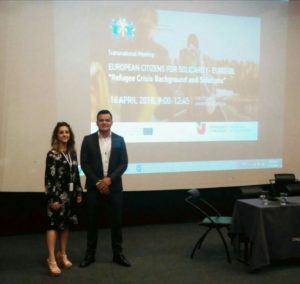 Since last March representatives of these countries along with UK, Bulgaria, Poland, and Lithuania have been gathered to discuss the migrants’ and refugees’ situation within the EUROSOL project funded by the EU.
Since last March representatives of these countries along with UK, Bulgaria, Poland, and Lithuania have been gathered to discuss the migrants’ and refugees’ situation within the EUROSOL project funded by the EU.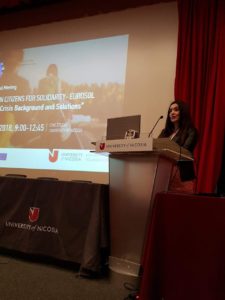 After the introduction and greetings by the Rector of the University and the explanation of the progress of the project by the coordinator Clara Ubeda, the day of discussion developed in four different sessions:
After the introduction and greetings by the Rector of the University and the explanation of the progress of the project by the coordinator Clara Ubeda, the day of discussion developed in four different sessions: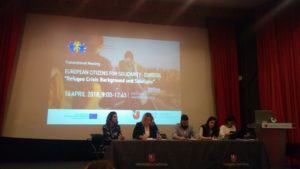 UNESCO Chair collaborator, Serena Montefusco was involved as a moderator in the first round table in which students of the Faculty of Law presented on the principle of non-refoulement. The three students analyzed both the right to asylum and the principle of non-refoulement under the European law. Giving an overview of the laws, protocols, regimes implemented by the EU it was possible to argue how the law is not transparent and distant from the actual reality. In other words, there are many laws that regulated the right to asylum that are not always clear and followed neither in their integrity nor partially. This concept was confirmed by Montefusco when presenting her collaboration with an NGO (
UNESCO Chair collaborator, Serena Montefusco was involved as a moderator in the first round table in which students of the Faculty of Law presented on the principle of non-refoulement. The three students analyzed both the right to asylum and the principle of non-refoulement under the European law. Giving an overview of the laws, protocols, regimes implemented by the EU it was possible to argue how the law is not transparent and distant from the actual reality. In other words, there are many laws that regulated the right to asylum that are not always clear and followed neither in their integrity nor partially. This concept was confirmed by Montefusco when presenting her collaboration with an NGO (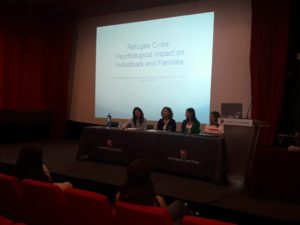 The second round table, moderated by Asya Rafaelova-Eneva of the Altius Francsico d Vitoria Fundation (Spain) and Bistra Choleva-Laleva of BIDA e.V Kultur un Bilding (Germany), one of the eight partners of the EUROSOL projects, analyzed, thanks to the Psychology students, the psychological impact that being an immigrant might cause to individuals and family. Indeed, there are a lot of studies that have seen that these people are affected by PTSD that cause panic attacks, depression, difficulties in maintaining relationships, suicidal thoughts, sleeping problems and others. These students presented three different cases of three Somalian girls who were affected by these symptoms due to the tremendous journey that they take to reconcile with their families in different parts of Europe. In cases of traumas, not only the work of psychologists is fundamental to get through the fears, but also social workers play a crucial role in the process of a successful social inclusion.
The second round table, moderated by Asya Rafaelova-Eneva of the Altius Francsico d Vitoria Fundation (Spain) and Bistra Choleva-Laleva of BIDA e.V Kultur un Bilding (Germany), one of the eight partners of the EUROSOL projects, analyzed, thanks to the Psychology students, the psychological impact that being an immigrant might cause to individuals and family. Indeed, there are a lot of studies that have seen that these people are affected by PTSD that cause panic attacks, depression, difficulties in maintaining relationships, suicidal thoughts, sleeping problems and others. These students presented three different cases of three Somalian girls who were affected by these symptoms due to the tremendous journey that they take to reconcile with their families in different parts of Europe. In cases of traumas, not only the work of psychologists is fundamental to get through the fears, but also social workers play a crucial role in the process of a successful social inclusion.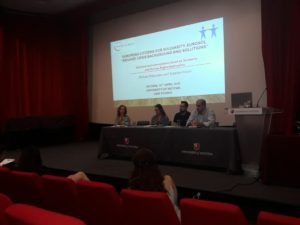 The third round table moderated by the University of Nicosia Research Foundation Director Stefanos Spaneas and Beata Palac, representative of the Poland partner within the EUROSOL project, presented the impressive work and the role of social workers in refugees related matters. Students of the social work program at the University of Nicosia emphasized the importance of values such as freedom, dignity, equity, and solidarity and rights such as the right to education, work and to have a house. Social workers promote the mutual integration among locals and migrants through a multidisciplinary work (psychologist, lawyers, interpreters, …) to ameliorate the migrants’ situation providing them training courses to find better jobs position to give back to society.
The third round table moderated by the University of Nicosia Research Foundation Director Stefanos Spaneas and Beata Palac, representative of the Poland partner within the EUROSOL project, presented the impressive work and the role of social workers in refugees related matters. Students of the social work program at the University of Nicosia emphasized the importance of values such as freedom, dignity, equity, and solidarity and rights such as the right to education, work and to have a house. Social workers promote the mutual integration among locals and migrants through a multidisciplinary work (psychologist, lawyers, interpreters, …) to ameliorate the migrants’ situation providing them training courses to find better jobs position to give back to society.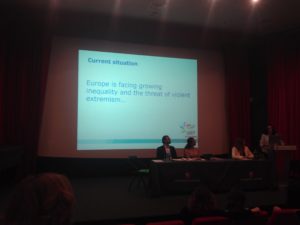 The last session was dedicated to discussing possible solutions and to analyzing some programs that are already implemented and that are better the life of many. Introduced by Dr. Despina Cochliou, the representative of the Erasmus Plus program, the program could share the language courses that the European Union is providing for free. As well known, the knowledge of the local language when one is forced to move to another place is fundamental. Many people in the audience did not know that funds are not only implanted in Cyprus but also in other different countries. Thus, it seems that the European Union needs to improve the way the news is spread. Yet, it is reassuring that there are people that dedicate their lives to this type of work that informs migrants that there are possibilities and accessibility to these programs. Next, Dr. Despina Cochliou introduced an NGO named AWARE (Cyprus) which is a communication and counseling agency which is committed to raise awareness of refugees related matters. They own a constantly updated website and active profiles on social media allowing the share of the latest news and connection among different ethnical groups. The session concluded with the testimony of two refugees that had the possibility to recreate their life in Cyprus. They are both well-educated Syrians, one of whom is working as a leader, mentor and life coaching and the other of whom obtained two bachelor’s degrees in Law Banking and Economics. For privacy reasons, I am not sharing their names, but they serve as an example of a successful social inclusion.
The last session was dedicated to discussing possible solutions and to analyzing some programs that are already implemented and that are better the life of many. Introduced by Dr. Despina Cochliou, the representative of the Erasmus Plus program, the program could share the language courses that the European Union is providing for free. As well known, the knowledge of the local language when one is forced to move to another place is fundamental. Many people in the audience did not know that funds are not only implanted in Cyprus but also in other different countries. Thus, it seems that the European Union needs to improve the way the news is spread. Yet, it is reassuring that there are people that dedicate their lives to this type of work that informs migrants that there are possibilities and accessibility to these programs. Next, Dr. Despina Cochliou introduced an NGO named AWARE (Cyprus) which is a communication and counseling agency which is committed to raise awareness of refugees related matters. They own a constantly updated website and active profiles on social media allowing the share of the latest news and connection among different ethnical groups. The session concluded with the testimony of two refugees that had the possibility to recreate their life in Cyprus. They are both well-educated Syrians, one of whom is working as a leader, mentor and life coaching and the other of whom obtained two bachelor’s degrees in Law Banking and Economics. For privacy reasons, I am not sharing their names, but they serve as an example of a successful social inclusion.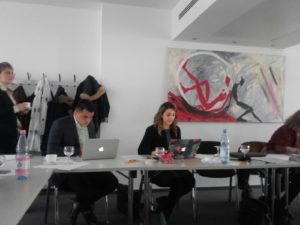 Serena Montefusco started giving information how institutions are dealing with the great number of migrants arriving in Italy. At the European level, she saw that soft low and funding activities have been implemented to improve the labour market and integration of migrants. For example, in 2016, thanks to the Action Plan on the Integration of the Third Country Nationals and the New Skills Agenda for Europe, it was possible to implement new tools aiming at helping integrate newcomers and local stakeholders assess their qualifications and skills. Moreover, Europe is offering significant funding for labour market integration. Yet, these funds are granted by each Member State and reach cities indirectly. At National level, institutions are responsible for labour law, social security, and active employment policies. Even though decentralized member states, such as Italy, face a formal devolution of responsibilities, the national government sets out an integration plan, objectives, and managing public employment services.
Serena Montefusco started giving information how institutions are dealing with the great number of migrants arriving in Italy. At the European level, she saw that soft low and funding activities have been implemented to improve the labour market and integration of migrants. For example, in 2016, thanks to the Action Plan on the Integration of the Third Country Nationals and the New Skills Agenda for Europe, it was possible to implement new tools aiming at helping integrate newcomers and local stakeholders assess their qualifications and skills. Moreover, Europe is offering significant funding for labour market integration. Yet, these funds are granted by each Member State and reach cities indirectly. At National level, institutions are responsible for labour law, social security, and active employment policies. Even though decentralized member states, such as Italy, face a formal devolution of responsibilities, the national government sets out an integration plan, objectives, and managing public employment services.
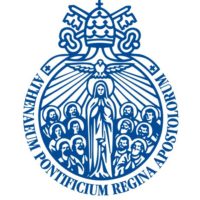



 UNESCO Chair Fellow Joseph Tham presented the book Religious Perspectives on Bioethics and Human Rights at the Baptist University of Hong Kong on January 3. The work is based upon texts presented and discussed at the same university in December 2013. The various contributions all analyzed Article 12 of UNESCO Declaration on Bioethics and Human Rights on respect for cultural diversity and pluralism, which states: “The importance of cultural diversity and pluralism should be given due regard. However, such considerations are not to be invoked to infringe upon human dignity, human rights and fundamental freedoms, nor upon the principles set out in this Declaration, nor to limit their scope.”
UNESCO Chair Fellow Joseph Tham presented the book Religious Perspectives on Bioethics and Human Rights at the Baptist University of Hong Kong on January 3. The work is based upon texts presented and discussed at the same university in December 2013. The various contributions all analyzed Article 12 of UNESCO Declaration on Bioethics and Human Rights on respect for cultural diversity and pluralism, which states: “The importance of cultural diversity and pluralism should be given due regard. However, such considerations are not to be invoked to infringe upon human dignity, human rights and fundamental freedoms, nor upon the principles set out in this Declaration, nor to limit their scope.” Tham offered a general overview of the process of discussion that gave rise to the book. He noted the unique dynamic of the Bioethics, Multiculturalism, and Religion workshops by which participants both present their research and receive substantial feedback from colleagues so that their final printed essay might benefit from the insights of others. He also discussed the different problems faced in the areas of human rights and cultural diversity discussed by various papers in the book. In particular, there tends to be a fundamental divide between those who take a thin or practical approach to the universality of the human rights and those who take a more thick or substantive approach. The former usually promote a minimalist ethic, secular reasoning, pragmatic agreements, rights language, and decry ideologies. The latter, on the other hand, normally promote a richer ethical discourse, address the importance of metaphysics and religious faith, admit religious particularity, and emphasize duties.
Tham offered a general overview of the process of discussion that gave rise to the book. He noted the unique dynamic of the Bioethics, Multiculturalism, and Religion workshops by which participants both present their research and receive substantial feedback from colleagues so that their final printed essay might benefit from the insights of others. He also discussed the different problems faced in the areas of human rights and cultural diversity discussed by various papers in the book. In particular, there tends to be a fundamental divide between those who take a thin or practical approach to the universality of the human rights and those who take a more thick or substantive approach. The former usually promote a minimalist ethic, secular reasoning, pragmatic agreements, rights language, and decry ideologies. The latter, on the other hand, normally promote a richer ethical discourse, address the importance of metaphysics and religious faith, admit religious particularity, and emphasize duties. Prof. Kai Man Kwan, a co-editor of the book, spoke on human rights from a Christian perspective, tracing its roots and mentioning the importance of what the first-generation of human rights advocates promoted as basic rights. He then traced the historic developments that have led to unjustified attempt to multiply dubious rights. Prof. Ellen Zhang spoke about the difficulties faced in Buddhism regarding the rights language, since it is a tradition more interested in spiritual liberation than individualistic claims. Prof. Jonathan Chan, another author of the book who was present, spoke about Confucianism its great difficulties accepting human rights. A lively question and answer session confirmed the relevance of the book’s subject and the need for ongoing dialogue and debate.
Prof. Kai Man Kwan, a co-editor of the book, spoke on human rights from a Christian perspective, tracing its roots and mentioning the importance of what the first-generation of human rights advocates promoted as basic rights. He then traced the historic developments that have led to unjustified attempt to multiply dubious rights. Prof. Ellen Zhang spoke about the difficulties faced in Buddhism regarding the rights language, since it is a tradition more interested in spiritual liberation than individualistic claims. Prof. Jonathan Chan, another author of the book who was present, spoke about Confucianism its great difficulties accepting human rights. A lively question and answer session confirmed the relevance of the book’s subject and the need for ongoing dialogue and debate.